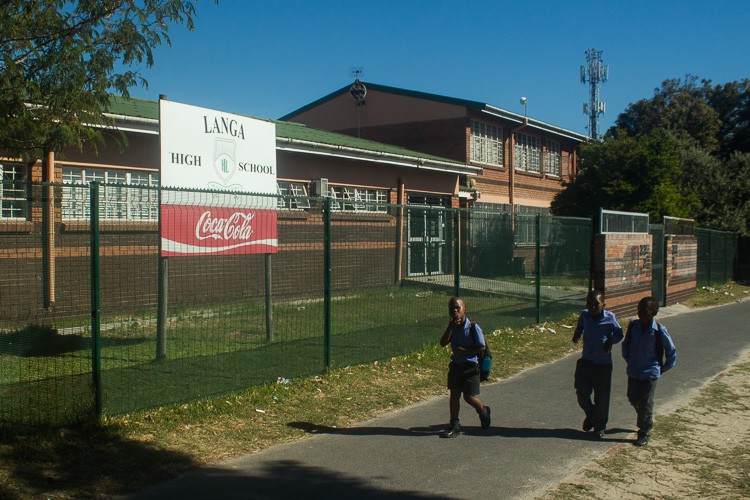
Langa High School is one of seven Western Cape schools that is a part of the Public School Partnership. Photo: Ashraf Hendricks
24 April 2017
Not every child enters Grade 1 bright-eyed and bushy-tailed. Many learners start school without the benefit of sufficient food or exposure to books and early learning. In the Western and Northern Cape in particular, the effects of foetal alcohol and tik seriously erode their educational potential. Still, well over half of our children come to school eager and able to learn. There, in thousands of failing schools, we let them down.
In a government school not far from the opulent Durbanville Hills, almost 60% of learners passed the standardised Grade 1 test for maths this year. Among the 160 Grade 7’s however, only one child scored above 50%. The logical conclusion is that the system is failing the children, allowing their potential to dribble away over the 10,000 hours they spend in primary school.
In general, language and maths results in former white schools are still much higher than schools previously classified as black. Yes, apartheid is to blame, but the relative performance of schools has not changed over the past 20 years. The quality curve in public education is still a two-humped camel - or more precisely, the shape of a turtle. About 15% of government schools are good, but most seriously underperform. We may console ourselves that ‘educational reform’ takes time, but tell that to the child starting school this year whose chance of successfully completing school is less than 50%.
We owe it to that child to think differently, to try out new ways of radically improving results in under-performing schools. One initiative trying to do just that is the Public School Partnership, which brings in non-profit school operating partners (SOPs) to work with the principal and staff in turning schools around. In this arrangement, the school governing body (SGB) is typically constituted as a fifty-fifty partnership between the SOP and the parents and staff. The entire parent body votes to accept the changed composition and retains the right to terminate the school’s involvement in the partnership. The department of education hold the SOP to account for school performance and quality outcomes.
The quid pro quo is that these schools have greater flexibility in terms of staff hire, budget use and curriculum than a normal public school. Despite this flexibility, they remain public schools, aimed at strengthening government’s mandate of ensuring high quality education to the poorest children. So far, seven schools in the Western Cape have joined the initiative and plans are underway to extend it to Gauteng and the Eastern Cape. In time, the vision is a number of networks of high performing public schools serving the poorest communities.
These partnerships have been criticised as privatising public education and ‘casualising’ the employment of teachers. Some assert that, through this partnership, private companies are going to derive profit from poor children. To be clear, the school operating partners are not-for-profit organisations operating in no-fee schools. There is simply no money to be made! As for security of tenure of teachers, the department guarantees funding to the value of an equivalent staff establishment in any other government school.
It remains to be seen whether this initiative will dramatically improve school outcomes, and whether it can be done at a cost that is affordable at scale. These elements are being tested over a five year period through independent evaluation. Our biggest concern is that even intensive support and remediation may not be enough to overcome the learning deficits already encountered in children entering school for the first time.
The state must act to meet its Constitutional mandate of ensuring provision of public education to those who cannot afford to pay. It must finance quality education, but there is no reason why it should be the only supplier. This principle is already implicit in the proposed National Health Insurance scheme, which aims to extend access to quality health care through both non-profit and commercial contractors. The problem is that the price of private medicine is so high that it is hard to imagine how the state will ever afford to implement it. We are not yet at that point in education. There is still time to show that South Africa can provide good public education, without the motive of profit, at an affordable price.
Public School Partnerships will not address all the problems in basic education. It only aims to intensify support and development of failing schools serving marginalised communities. Some argue that Public School Partnerships are the thin edge of the wedge of privatisation of the public sector. They need to explain how involvement in any of these schools could possibly make commercial sense, now or in the future. The reality is that parents with any disposable income are voting with their feet and putting their children in low-fee independent schools. If we can’t find ways to make public schools as attractive as private schools, they will become increasingly stigmatised as places where only poor kids go.
See also: Mixed reactions to public-private schools partnership
Views expressed are not necessarily GroundUp’s.